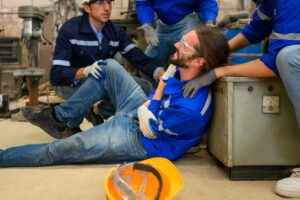According to the National Institute of Health, heavy drinkers were 1.7 times more likely than abstainers to report an accidental injury, 3.8 times more likely to report injuries requiring hospitalization, and 2 times more likely to report a job-based injury.

Additionally, people reporting the use of psychoactive drugs were 1.7 times more likely than abstainers to report work accidents, and 2.4 times more likely to report having been hospitalized as the result of an accident.
Virginia law: Intoxication and work injuries
In Virginia, if a work accident is caused by the injured worker’s use of alcohol or drugs, these employees can be barred from receiving workers’ compensation benefits. Section 65.2-306 of the Code of Virginia specifically states:
No compensation shall be awarded to the employee or his dependents for an injury or death caused by:
- The employee’s intoxication.
or
- The employee’s use of a nonprescribed controlled substance identified as such in Chapter 34 (§ 54.1-3400 et seq.) of Title 54.1.
“The person or entity asserting any of the defenses in this section shall have the burden of proof…However, if the employer raises as a defense the employee’s intoxication or use of a nonprescribed controlled substance identified as such in Chapter 34 of Title 54.1, and there was at the time of the injury an amount of alcohol or nonprescribed controlled substance in the bodily fluids of the employee which (i) is equal to or greater than the standard set forth in § 18.2-266, or (ii) in the case of use of a nonprescribed controlled substance, yields a positive test result from a Substance Abuse and Mental Health Services Administration (SAMHSA) certified laboratory, there shall be a rebuttable presumption, which presumption shall not be available if the employee dies as a result of his injuries, that the employee was intoxicated due to the consumption of alcohol or using a nonprescribed controlled substance at the time of his injury. The employee may overcome such a presumption by clear and convincing evidence.”

Breaking down Virginia’s workers’ compensation code
This code section is very dense, so let’s break it down into understandable parts:
First, the employer bears the burden of proving the injured worker’s intoxication. This will depend on the results of a drug or alcohol screening. Under this code section, if an injured worker’s alcohol screening after an accident shows a blood alcohol concentration of .08 or greater, the employer gets a presumption that the worker was intoxicated at the time of the accident. An injured worker can overcome the intoxication presumption by presenting clear and convincing evidence to the contrary. This is an extremely high burden which can be difficult to meet. The Supreme Court of Viginia defines clear and convincing evidence as:
“…that measure or degree of proof which will produce in the mind of the trier of facts a firm belief or conviction as to the allegations sought to be established. It is intermediate, being more than a mere preponderance, but not to the extent of such certainty as is required beyond a reasonable doubt as in criminal cases. It does not mean clear and unequivocal.” Fred C. Walker Agency, Inc. v. Lucas, 215 Va. 535, 540-541 (1975).
The normal standard of proof in workers’ compensation cases is a preponderance of the evidence. Simply put, this means “more likely than not.”
Section 65.2-306 also provides that the mere presence of a non-controlled substance in your test results entitles the employer to a presumption that you were intoxicated. The only requirement is that the test result come from a Substance Abuse and Mental Health Services Administration (SAMHSA)-certified laboratory. Again, an injured worker can overcome this presumption but only through clear and convincing evidence.
Section 65.2-306 does not allow the employer the presumption of intoxication if an injured worker dies as a result of the work accident. This does not mean the employer cannot raise and prove an intoxication defense. It simply means the employer is not entitled to a presumption of intoxication.
Even if an injured worker’s post-accident drug or alcohol screen is positive, the employer must still prove some additional elements to successfully use an intoxication defense. The employer must also prove that the intoxication caused or contributed to the accident. As noted by the Court of Appeals of Virginia in Wyle v. Professional Services Industries, 12 Va. App. 684, 406 S.E.2d 410 (1991), an accident may have more than one proximate cause. This means the Virginia Workers’ Compensation Commission must consider whether the injured worker’s intoxication played any part in contributing to the accident. For example, if a worker is injured in a work-related car accident in which he or she was merely a passenger, any alleged intoxication would be irrelevant.
The Commission also places one final burden on the employer that raises an intoxication defense. Rule 1.10 of the Rules of the Commission provides:
“If the employer intends to rely upon a defense under § 65.2-306 of the Act, it shall give to the employee and file with the Commission no less than 15 days prior to the hearing, a notice of its intent to make such defense together with a statement of the particular act relied upon as showing willful misconduct.”

In the case of Lowe’s of Short Pump v. Campbell, 38 Va. App. 55, 561 S.E.2d 757 (2002), the Virginia Court of Appeals upheld the Commission’s barring of an employer’s ability to raise an intoxication defense where timely notice of that defense was not given pursuant to Rule 1.10. This means that even if a post-accident drug screen is positive following an accident, the employer must give notice of its intent to rely on an intoxication defense at least 15 days prior to the hearing. Failure to do so bars the employer from raising the defense.
There are several ways to prepare for and negate an intoxication defense, but timing is critical. If you have been injured on the job and your post-accident drug or alcohol screening is positive, (or if you believe it will be positive) it is imperative for you to retain the services of an experienced workers’ compensation lawyer as soon as possible after the accident. Failure to do so may result in your workers’ compensation claim being barred.
Call the experienced workers’ compensation attorneys at Allen and Allen, we are here to help you recover the compensation to which you are entitled. For a free case evaluation, call 866-388-1307 today.




